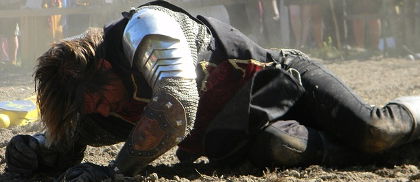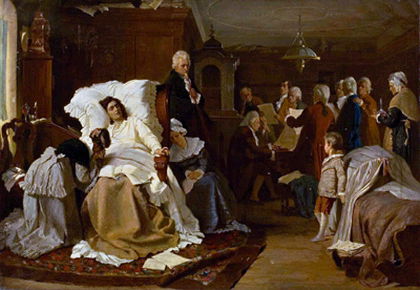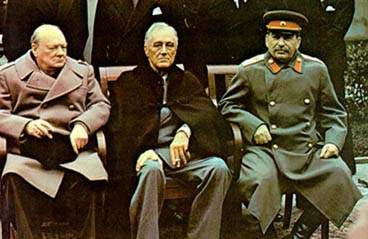Jonathan Dodd‘s latest column. Guest opinion articles do not necessarily reflect the views of the publication. Ed
I’ve become an avid fan of Game of Thrones. Not in a watch-each-episode-every-week way, because my life just doesn’t have that kind of pattern. Probably my refusal to get Sky doesn’t help there either. When it comes to good television series I don’t mind waiting for the box set. So I’ve become part of a new breed. We’ve got the Irish Setter, the English Setter, and now there’s the Box Setter.
You can always tell the Box Setter at work on Monday mornings. They look exhausted, with saggy reddened eyes and a distracted air. No, they haven’t been clubbing all weekend, or partaking in noxious substances, they just stayed up for 24 hours straight catching the latest season of Breaking Bad or Mad Men. I’ve done that, although it was West Wing and Rome for me, until Game of Thrones came along.
Mayhem, savagery, rumpy-pumpy and general weirdness
For those of you who haven’t been sucked in to this particular series and therefore don’t know what all the fuss is about, it’s an immense fantasy about seven kingdoms, all plotting and going to war with each other, in a mythical world not completely unlike ours about a thousand years ago with lots of fights and plots, and a bit of magic thrown in. Most of the lead characters are played by unknown actors, and they all perform brilliantly. Future stars, the lot of them. I predict.

There’s an awful lot of mayhem, savagery, rumpy-pumpy and general weirdness. Characters that we grow to like get killed off or worse, it’s genuinely shocking sometimes, and it can also be rather silly, but it’s amazing television, done with sweep and style and panache and lots of money. It’s brilliant. They’re showing Series 4 on Sky right now, and we’ve just watched the Series 3 box set. I can’t wait until next year for my next GoT fix.
Plainly off his tiny little trolley
One thing that interests me about it is all the royal families, who are totally obsessed with their bloodlines. It’s as if they really believe that the qualities that caused an ancestor to win a battle and slaughter their enemies are somehow going to be passed down through the generations. In some cases this may be so, but not always. There’s a character in GoT who is plainly off his tiny little trolley but everyone has to let him have his way because he’s the King. Obviously normal rules cease to apply once your bloodline is established.

This idea has always puzzled me. I’m not aware of any evidence that talent or intelligence is passed down the generations. Whatever happened to Mozart’s children? Or Einstein’s descendants? As far as I know the laws of Darwinism only apply to survival tactics, and they relate more to unexpected gene changes rather than pre-existing genes. Farmers are always improving their stock by introducing new bloodlines, and they are practical about which animals are allowed to breed, unlike humans.
Reward those you leave behind
This over-respect for particular traits has never worked, because it’s always deeply conservative, wanting to keep things exactly as they are, rather than recognising that the race improves by overcoming new challenges. Sadly most of our attempts to bring our genes into line are about economics. Some people obsessively dedicate their lives to acquiring power and riches, and then when they get it they don’t know what to do next, so they try to perpetuate this power, usually by passing it on to their children. This has rarely worked in a satisfactory way.

I suppose it’s all too human to hope that your efforts will reward those you leave behind, and there’s always a tendency to immortalise yourself in some way. But even if the inheritance sticks, it becomes increasingly watered-down. I doubt that Henry VIII would have much time for his 21st Century descendants. They’ve managed to hang on to the money, but the power’s gone completely, and most of the character.
More likely a loss of focus
I did once hear that the Roman Empire declined and fell because of plumbing. Lead poisoning from their water supply was blamed, but I think this might have been discredited since. I think it was more likely a loss of focus. At its height, the sons of Roman families expected to go out conquering in the name of the Empire. “Come back with your shield or on it!” said their mothers, a saying borrowed from the Spartans, another race who tried to keep their genes in order.

By the end, most of the Romans wanted to stay home, and subcontracted the conquering to armies recruited from conquered territories. Most Roman citizens had never been to Rome, much in the way that 99% of Manchester United supporters will never actually be able to see their team play. I imagine the heart and urgency just leeched away in a haze of diversification and sub-contracting.
Bitter and obstinate enemies
One of the good things about Game of Thrones is that quite often bitter and obstinate enemies find themselves having to join forces when a greater threat comes from elsewhere. It’s peace and plenty that makes us soft and vulnerable, and new enemies that keep us on our toes.

If enemies did not exist, it would be necessary to invent them. I think we already do that.
If you have been, thank you for reading this.
Image: Doug Kline under CC BY 2.0
Image: JaymeTHunt under CC BY 2.0
Image: Public Domain
Image: Ricardo Stuckert/ABr under CC BY 2.0
Image: kim traynor under CC BY 2.0
Image: Public Domain





